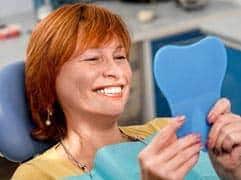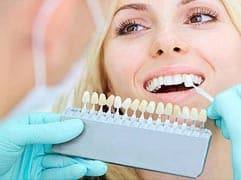Tooth Decay Symptoms
Tooth decay occurs when acid, which is produced by plaque, builds up on the teeth over time.
When plaque builds up, it can lead to additional issues including dental caries or holes in the teeth, gum disease or dental abscesses. An abscess occurs when there is a collection of pus found in the gums or at the end of the tooth.
Tooth Decay Symptoms
Tooth decay does not always result in pain. If you have dental caries or cavities, however you may experience the following symptoms:
- Toothache: this can be a continuous pain which may keep you awake at night or an occasional sharp pain
- Tooth sensitivity: you may experience tenderness or pain when you eat or drink something that is hot, cold or sweet
- Grey, brown or black spots on your teeth
- Foul breath
- Unpleasant taste in your mouth
It is important to visit your dentist regularly to ensure early tooth decay can be treated as soon as possible. Frequent visits to the dentist can also help prevent decay altogether. In the early stages, tooth decay is much easier and more affordable to treat. Dentists can typically identify tooth decay and any other issues with a simple examination or X-ray. Most adults should have a check-up and professional cleaning at least once or twice a year.
Tooth Decay Treatment
The proper treatment for tooth decay depends on how advanced the issue is.
- Early stage tooth decay: the dentist will discuss how much sugar you are consuming, your diet and eating habits. The dentist may also apply a fluoride gel, varnish or paste to the area to help strengthen the enamel. This makes the teeth more resistant to the acids produced by plaque which can result in tooth decay.
- Filling or crown: Your dentist may recommend you get a filling or a crown where the tooth decay has taken place. This involves the removal of the decay and filling of the hole. The dentist will often use a local anesthetic to numb the treatment area.
- Tooth decay in the pulp: When tooth decay has spread to the centre of the tooth, which contains blood and nerves, a root canal treatment may be used.
- Tooth extraction: When the tooth has been damaged beyond possible restoration, it may need to be removed. If this is the case, your dentist may be able to replace the tooth using a partial denture, bridge or implant.
Tooth Decay Prevention
While tooth decay is a common problem, it can often be completely prevented. The best way to avoid tooth decay is to maintain a good oral hygiene regimen and keep the teeth and gums healthy. Below are suggestions for maintaining good oral health:
- Regular visits to the dentist: based on the condition of your mouth, teeth and gums, your dentist will determine how often they need to visit the dentist
- Healthy diet: it is important to limit sugary and starchy food and drinks. This is especially important between meals or an hour prior to going to bed. Some medications may also contain sugar, request sugar-free options, when possible.
- Good oral hygiene: brush your teeth using a fluoride toothpaste at least twice a day. Frequent flossing is also important for good oral health.
- Lifestyle choices: avoid smoking and excessive consumption of alcohol. Tobacco can impact your production of saliva, which is needed in order to keep your teeth clean. Alcohol can also contribute to erosion of the tooth’s enamel.
- Dental issues: follow up with your dentist as soon as possible if you experience any issues with your mouth or teeth. This can include pain, sensitivity, a dry mouth or chronically bad breath as these issues can be a sign of decay or an imbalance in the mouth.
More on Tooth Decay : What Causes Tooth Decay?
Actual Patient Reviews
We have so many terrific reviews it's impossible for us to list them all! Thanks for supporting Iowa Dental Group with your gratitude.
Dental Office Location
Iowa Dental Group prides ourselves in offering the highest quality dentistry at a fair and reasonable fee.
Des Moines, Ia 50311
(515) 277-6358
iowadentalgroup@hotmail.com
https://www.iowadentalgroup.com
Iowa Dental Group Contact Form
Our Des Moines' Dentists Bob Margeas DDS & Nicholas Economos are eager to help provide any answers you may have. Contact us today regarding optimal oral health.
Dentist Office Hours
Our Dentists look forward to answering any dentistry related questions or dental concerns you may have regarding your overall oral health and smile.
Office Hours
| Monday: | 7:30am - 5:00pm |
| Tuesday: | 7:30am - 5:00pm |
| Wednesday: | 7:30am - 5:00pm |
| Thursday: | 7:30am - 5:00pm |
| Friday: | Closed |
| Saturday: | Closed |
| Sunday: | Closed |
















